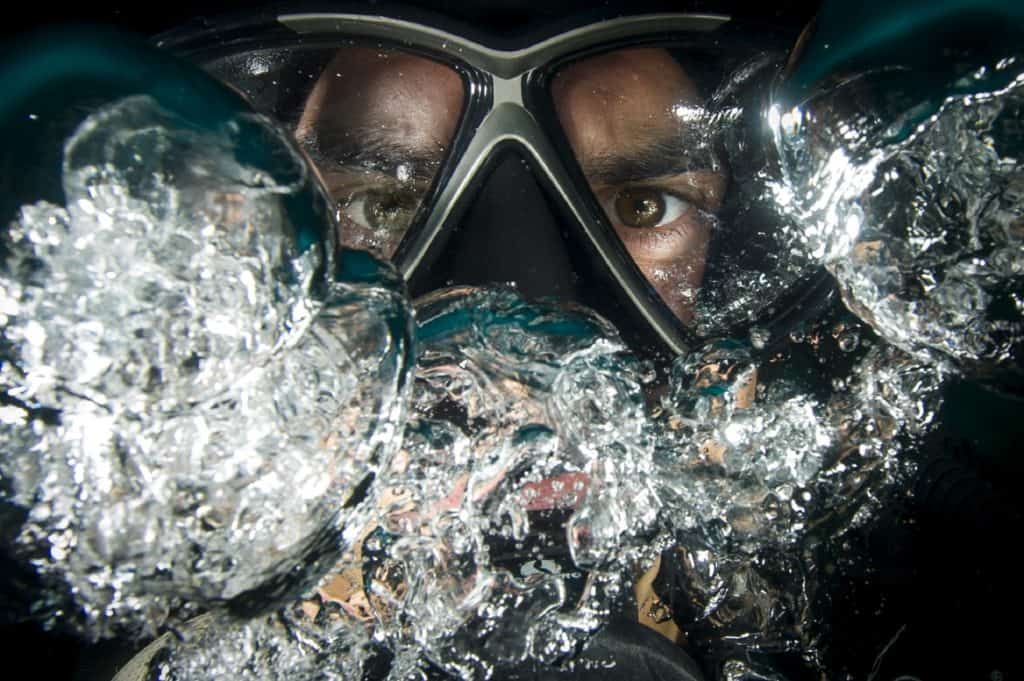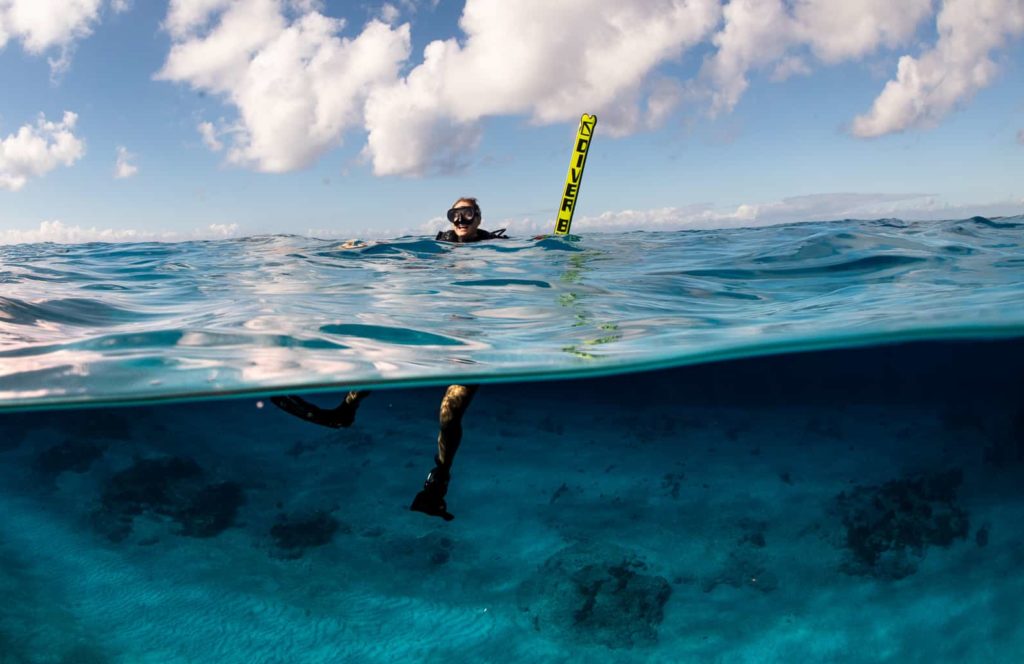An important part of the open water diver certification is learning about the buddy system while diving. The respective pre-dive checks, buddy awareness, and team problem-solving like air-sharing are part of every training dive. But what about solo diving? Can you dive alone with a PADI open water diver certification?
This and more questions are what we will discuss in this blog post. We’ll explain to you what solo diving is, if it’s safe, and what you need to solo dive.
What Does Dive Solo Mean?
Diving solo is exactly what you think it is. Solo diving means that a diver is conducting an immersion or parts of it by himself, without a dive buddy or guide. This comes with a huge responsibility, that new divers usually underestimate. We often get asked by new students, upon enrolling in their open water diver course: Can I dive alone after certification?
The easy answer to that is NO. You can’t. You can certainly dive without an instructor after certification but are required to dive with a dive buddy who holds the same or higher certification level.
Why Should You Never Dive Alone?
SCUBA diving is a recreational sport, but it comes with hazards and unforeseen incidents now and then. In these situations, you might rely on a buddy to solve the issue for you. For example, if you accidentally run out of air during a dive. You will need your dive buddy to help you ascend while sharing air. Or you might get entangled during a dive and require your buddy to help free you.
These are only some of the situations a diver might face after certification. Even though you will learn about proper dive planning, pre-dive checks, and problem-solving during your open water diving course, you should not underestimate the underwater environment. Especially as a beginner diver, you should not attempt to dive alone before seeking adequate training. Don’t just head out by yourself without being prepared and trained to solo dive.
Why To Dive Alone
Often professional divers consider SCUBA instructors to dive solo when conducting beginner courses, as they can’t rely on new students to give them a hand when running into an issue underwater. Apart from that example, there are a bunch of reasons for avid divers to dive alone.
Experienced divers often choose to dive solo for some of the following reasons:
Objective
Not all divers just dive to enjoy the colorful reefs and marine life underwater. Take an underwater photographer for example. He might be heading out to find a special species and hang out for several minutes at the same spot once he found it. He won’t want any non-photographer dive buddy to signal him to hurry up, because the group is leaving that spot. As well taking on the responsibility of watching over his buddy impairs his goal of focusing on marine life and capturing photos and videos of it.
Independence
Many divers don’t always have the opportunity to travel to dive with their buddies. They’ll be traveling alone on their dive trip. Being mixed up with a random buddy they’ve never met, nor know about their skill level might not sound too fancy for them. Imagine being buddied up with a much less experienced diver, that isn’t willing to learn, or prepared for a certain dive.
Avoiding the obligation to take a supervisory role over that diver, or end a dive much earlier than you would due to his poor air consumption is a good enough reason for avid divers to dive solo.
Logistics
Having a family or friend circle of non-divers is one of the most common reasons divers drop out of their hobby after a while. To many, it poses difficulty to set up dives and logistics, or even just find a same-skilled dive buddy. Matching free days, preparation, and dive planning become nearly impossible.
Therefore solo diving opens up a whole new world of opportunities for divers without diver-friends.
Ability to Focus
Some people tend to be more capable of focusing on what they’re doing when doing it by themselves. If you’re more of a lone wolf type of diver, solo diving might be for you. Many solo divers reason with feeling inner peace and tranquility when not being obliged to watch over a buddy while diving.

What Do You Need to Solo Dive?
First of all, to solo dive safely you should seek proper training and certification. Many SCUBA agencies offer solo diving or self-reliant diver courses (see below). During these courses, you learn about air redundancy, dive planning for conducting dives by yourself, what equipment to take with you, and how to solve possible incidents underwater being alone.
How To Solo Dive Safely
A solo diver has to be capable of assessing a situation correctly and have a skill set to fall back to solve these situations. You must carry a whole bunch of backup equipment, redundant gas, cutting devices, SMBs, backup torches, a backup dive computer, and more depending on the dive site, goal, and conditions to dive by yourself.
The buddy system is a helpful tool and for new divers just knowing that there are a pair of extra eyes and ears around helps them to reduce anxiety and situational stress underwater. There are whatsoever some circumstances when the buddy system isn’t as safe as it might seem.
Imagine gaps in skill level between buddies, different mental attitudes, objectives & goals for the dive.
What Can I Expect to Learn During A Solo Diving Course
To dive solo safely, training and preparing accordingly is of utmost importance. You can expect to learn about many different topics during a solo diving course, some of them (but not all) we named here:
- The Solo Diving Mentality
- Necessary paperwork for any solo dive
- What it means to be self-reliant
- When not to dive alone
- Potential risks of diving alone, and how to avoid them
- Equipment for solo diving and maintenance
- Pre-dive planning for a solo dive
- Problem-solving & rescue techniques to dive independently
- Gas management
- SMB & Lift bag use
Following we named some of the solo diving courses that allow you to dive by yourself after successful completion:
PADI Self-Reliant Diver Course
Requirements:
- PADI Advanced Open Water Diver or equivalent
- Minimum Age of 18 Years
- Complete a dive skill assessment
- Minimum of 100 dives logged
SDI Solo Diver Course
Requirements:
- SDI Advanced Diver or equivalent
- Minimum Age of 21 Years
- Proof of 100 dives logged
SSI Independent Diving Course
Requirements:
- SSI Open Water Diver or equivalent
- Minimum Age of 18 Years
Solo Diving: A Conclusion
Altogether, there are pros and cons to recreational solo diving, and they’re all valid. Whether you should dive alone or not mainly depends on your certification, experience level, and the circumstances surrounding the planned dive.
Surely you should seek proper training before attempting to dive alone. Your safety is always the first priority, and should therefore never be compromised for the pure thrill of it.
Whichever reason you have to dive alone, it’s important to be properly prepared for any dive, especially when you’re planning to dive solo.
We hope we could shed some light on the topic of diving without a buddy, and answer your questions about solo diving.


